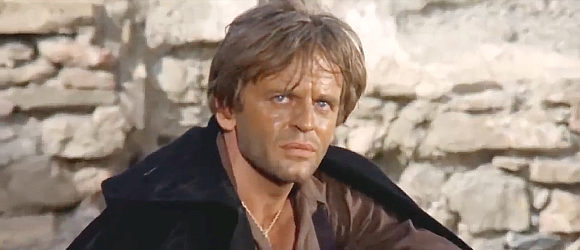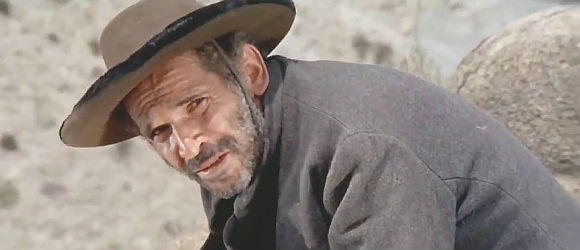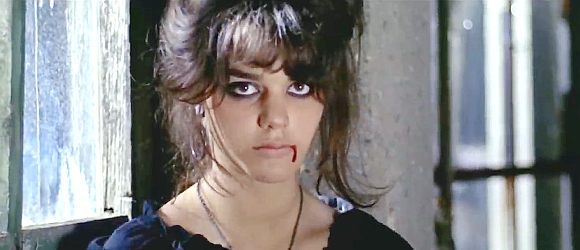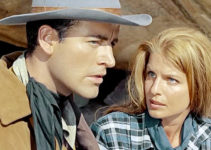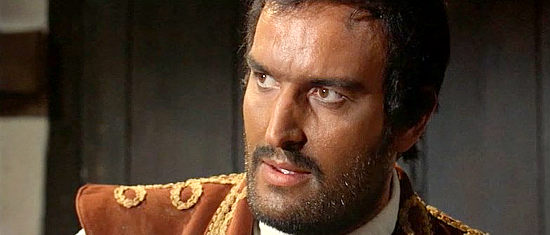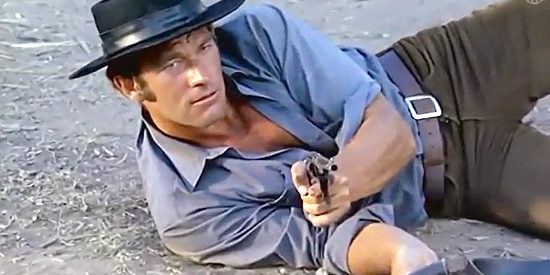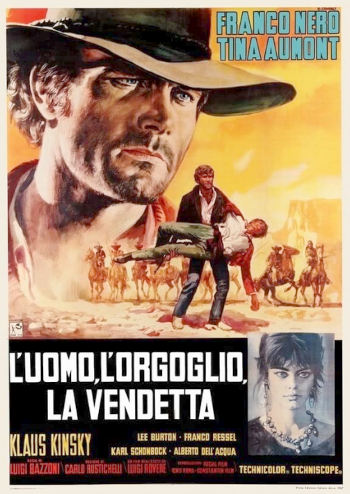 Franco Nero plays Don Jose, a young sergeant in the Spanish Army captivated by a pretty gypsy girl named Carmen (Tina Aumont) who stops by his post looking for work one day.
Franco Nero plays Don Jose, a young sergeant in the Spanish Army captivated by a pretty gypsy girl named Carmen (Tina Aumont) who stops by his post looking for work one day.
But the girl with the enchanting smile and the big brown eyes soon lands him in trouble. She stabs a co-worker, then runs off as Don Jose is leading her to the police station.
He’s demoted for allowing her to slip away, but still can’t get the lovely lass out of his mind.
Don Jose eventually lands in her bed. But while Carmen professes her love for him, he still doesn’t trust her completely.
So he follows her one day when she’s supposed to be working for a countess. Instead, she’s cuddling up with a lieutenant.
In the fight that follows, the lieutenant is killed, Don Jose seriously wounded.
Carmen whisks him off to a gypsy hideout to recover. When he does, Carmen begins planning the robbery of a rich Englishman for whom she’s “working.”
If all goes as planned, they’ll have enough money to buy passage on a boat and sail to the New World where they can start a new life, she tells Don Jose.
Wanting to keep violence to a minimum, he insists on planning the stage holdup.
But he returns from reconnaissance one day to find a surprise in camp — a man named Garcia (Klaus Kinski), just out of prison.
The second surprise: He’s Carmen’s husband.
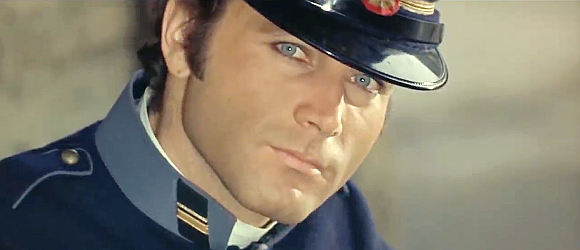
Franco Nero as Don Jose, a young sergeant in the Spanish Army, spotting Carmen for the first time in Man, Pride and Vengeance (1967)
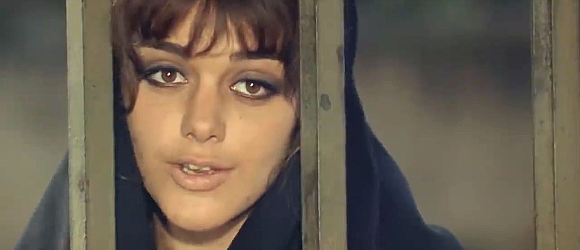
Tina Aumont as Carmen, using her charm on a young officer she just met in Man, Pride and Vengeance (1967)
Let the debate begin over whether this film adaptation of Carmen, the opera, should be classified as a Western.
After all, it’s set in Spain. And the first 30 minutes of the film focus almost entirely on Don Jose’s growing infatuation with Carmen and the strain that puts on his sense of duty to his uniform.
But once Don Jose is on the run for killing the lieutenant, the film turns much more Western like.
That’s helped by desert mountain scenery and lots of familiar faces, including Guido Lollobrigida, Albert Dell’Acqua and Jose Manual Martin, all part of the “gang” planning the holdup.
And that stage holdup is superbly filled. It’s also well planned by Nero’s character, though nothing goes as planned once Kinski becomes involved.
Anyway, debate away about the film’s Western creds. Regardless, it features fine performances by Nero and Aumont in the lead roles.
Interestingly, her life grows more comfortable as the film progresses and she hops from bed to bed.
On the other hand, Nero, once the handsome young soldier with a supposedly bright military future, transforms into a desperate, haggard man, on the run from the law.
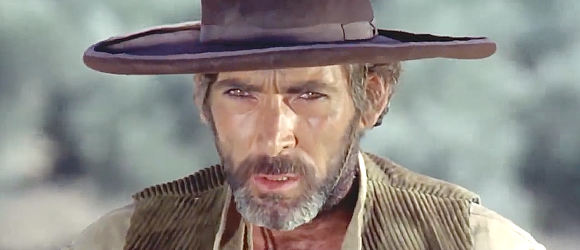
Guido Lollobrigida (Lee Burton) as Don Carlos, a member of the holdup gang in Man, Pride and Vengeance (1967)
Directed by:
Luigi Bazzoni
Cast:
Franco Nero … Don Jose / Django
Tina Aumont … Carmen / Conchita
Klaus Kinski … Miguel Garcia
Guido Lollobrigida …. Tanguiero
as Lee Burton
Franco Ressel … Lieutenant
Karl Schonbock … Rich Englishman
Alberto Dell’Acqua … Remandado “The Kid”
Marcella Valeri … Dorotea
Also with: Maria Mizar, Mara Carisi, Anna de Padova, Giovanni Ivan Scratuglia, Tino Buriani, Aldo Vasco, Hans Albrecht, Jose Manual Martin, Alba Maiolini, Luisa De Padova, Rex Gildo
Runtime: 100 min.
aka:
L’uomo, l’orgoglio, la vendetta
Pride and Vengeance
A Man, His Pride and His Vengeance
The Love, the Pride and the Vengeance
Music: Carlo Rustichelli
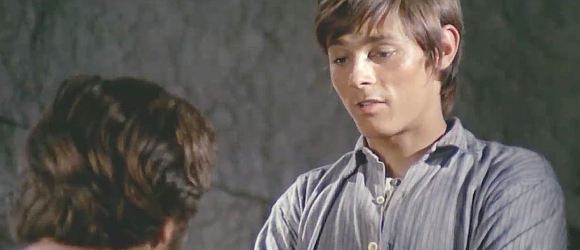
Alberto Dell’Acqua as Remandado, the young man who helps Don Jose recover from his wounds in Man, Pride and Vengeance (1967)
Memorable lines:
Carmen’s note to Don Jose: “I always pay my debts. Forgive me, sergeant, but the most important thing is to survive.”
Don Jose: “You’re a witch?”
Carmen: “Does that surprise you? I’m a gypsy. I thought you knew that already.”
Don Jose to Carmen: “I broke the law, thanks to you. And if I see you again, I’ll murder you.”
Garcia to Don Jose: “Listen, Preacher, I’ve got nothing personal against you. It’s the idea of having to share one ounce of that gold with you that turns my stomach.”
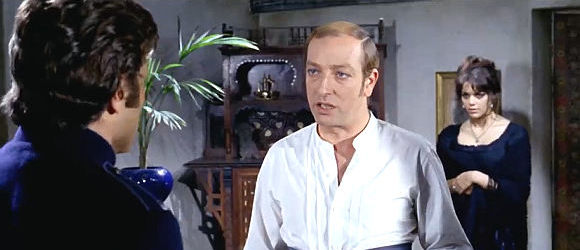
Don Jose finds Carmen spending time with a lieutenant (Franco Ressel) in Man, Pride and Vengeance (1967)
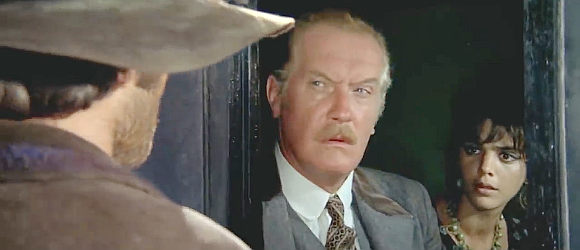
Karl Schonbock as the rich Englishman, being informed of a landslide by Don Jose in Man, Pride and Vengeance (1967)
Trivia:
* The German version of the film certainly does its best to sell this as a Western. Franco Nero’s character is named Django; Tina Aumont’s becomes Conchita and the locations are changed to Sante Fe and Mexico.
* Tina Aumont’s only other Euro Western was 1973’s “Brothers Blue,” also directed by Luigi Bazzoni. One of her early roles came in the 1966 Western comedy “Texas Across the River,” starring Dean Martin and Alain Delon.
* Karl Schonbock, who plays the rich Englishman here, is hardly a familiar face to Western fans, but racked up nearly 200 screen credits before his death in 2001 at age 92. Included among them: a co-starring role as John Jacob Astor in 1943’s “Titanic,” a German-made film about the ship’s tragic sinking.
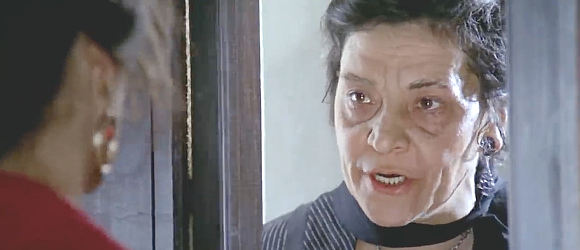
Marcella Valeri as Dorotea, Carmen’s landlady, growing tired of her antics in Man, Pride and Vengeance (1967)
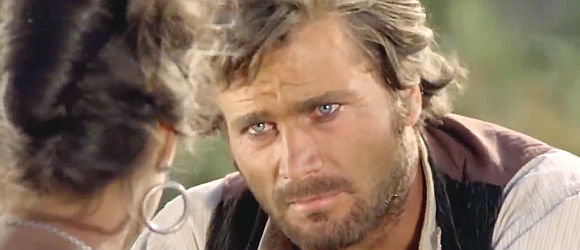
Franco Nero as Don Jose, already on the run, listening to Carmen’s latest plan in Man, Pride and Vengeance (1967)
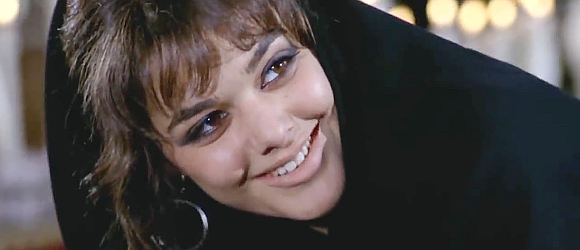
Tina Aumont as Carmen, telling Don Jose about her job with a countess in Man, Pride and Vengeance (1967)
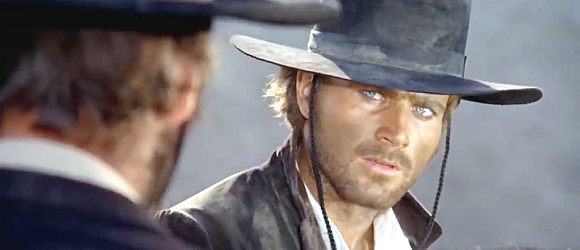
Franco Nero as Don Jose, determined to await his lady love before setting sail in Man, Pride and Vengeance (1967)

